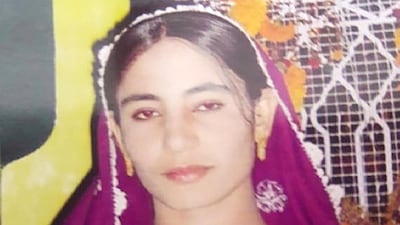The family of a pregnant woman who was tortured and beaten to death in Pakistan have revealed that she was reluctant to return to her husband's home in the weeks before her death.
Wazeeran Bibi's murder in the Jamshoro district of southern Sindh province on June 28 sparked outcry online. Her body was dumped by the side of a motorway, the family and police confirmed to The National.
Police say the killing was linked to the practice of watta satta - literally meaning give and take - wherein Bibi was matched with her husband Ali Bux in exchange for an agreement her younger brother would later marry into Bux’s family.
Police alleged that when the deal began to go awry, 30-year-old Bibi was murdered by her husband and accomplices.
“The killers pretended it was an accident and the body was unrecognisable with severe head and face injuries,” said Police Inspector Rasool Bakhsh Sheikh, who is investigating the murder.
A postmortem report seen by The National indicates Bibi died after "lethal injuries to the brain and face caused by hard and blunt substance," leading to accusations she was stoned to death. Bibi was 8 weeks pregnant at the time of her death, the report stated.
"I need the same punishment for the murderer and all should be hanged who killed my innocent daughter. If we do not get justice then we will take revenge by ourselves," Bibi's father Gul Mohammad told The National.
“My daughter’s body was fully injured and her face was unrecognisable and women who bathed her for the last rites could not bear the scenes and fainted. It takes courage to see such a brutally injured body. It’s like our blood has flown down in river Indus,” Mr Mohammad, a livestock worker by profession, said.
The case caught the attention of social media users after a video showing Mr Mohammad sobbing at his daughter’s graveside and begging for justice was posted on Twitter and viewed 150,000 times.
Social media users created a hashtag, #JusticeForWaziranChachar, to demand accountability and raise awareness of violence related to the practice of watta satta.
Inspector Sheikh said Bibi’s husband Ali Bux and his elder brother Kareem Bux had been arrested, but a third suspect, Abdul Qadir, is on the run. Police said the investigation will take some time.
In Pakistan’s conservative interior and southern regions of Sindh and Punjab the exchange of girls between two families is a common tribal practice.
In 2015, surveys published in the Open Journal of Social Sciences found that 92 per cent of respondents in southern Punjab who were married by watta satta were wedded to cousins.
Numerous studies and reports have found such exchanges often lead to violence being meted out against the women exchanged.
Bibi married five years ago on the condition that her brother Javed, who was 8 years old that time, would marry Ali Bux’s niece, Zaira, who was then just 5 years old.
When the time came for Javed, now 13, and Zaira, now 10, to wed, the Bux family refused to hand the little girl over. The resulting row between the families led to Bibi's father bringing her back to the family home and Mr Bux threatening to divorce Bibi, Allah Waraya, a family member of Bibi's told The National.
The dispute was later settled by local chieftain Mohammad Ilyas in a jirga - assembly of local leaders - and Bibi was sent back to her husband.
Mr Waraya said that Bibi expressed her concerns about returning to the relationship and to her husband's family.
“Just two weeks before her murder, Bibi, the eldest amongst six siblings, told her concerns to her mother Meer, saying ‘my husband and brother in law Kareem Bux are threatening me and please don’t demand a girl for Javed, it will ruin my life’,” said Mr Waraya.
Activists have long campaigned against the practice of watta satta due to severe threat of retaliation and violence under this type of marriage settlement. It is a widespread issue - a survey conducted by Rutgers World Population Foundation in 2013 found that more than 77 per cent of marriages in Pakistan were settled under customary practices such as watta satta and 66 per cent of married women had experienced violence in their marriage.
"The issue and the reason for the murder of Ms Bibi is not yet clear, but it is obvious that crime against women has reached such a brutal level that killers haven't spared single part of her body to be mutilated," women rights activist in Sindh, Amar Sindhu, told The National.
“This case has shown misogyny at work in many layers of society,” she added, saying at the family, police and judicial levels, women are not protected and predicting Bibi’s suspected killers would be released on bail soon.
“In between, there is society or the social norms which are also only to raise insecurities in women. Woman are easy prey for society,” she said.

